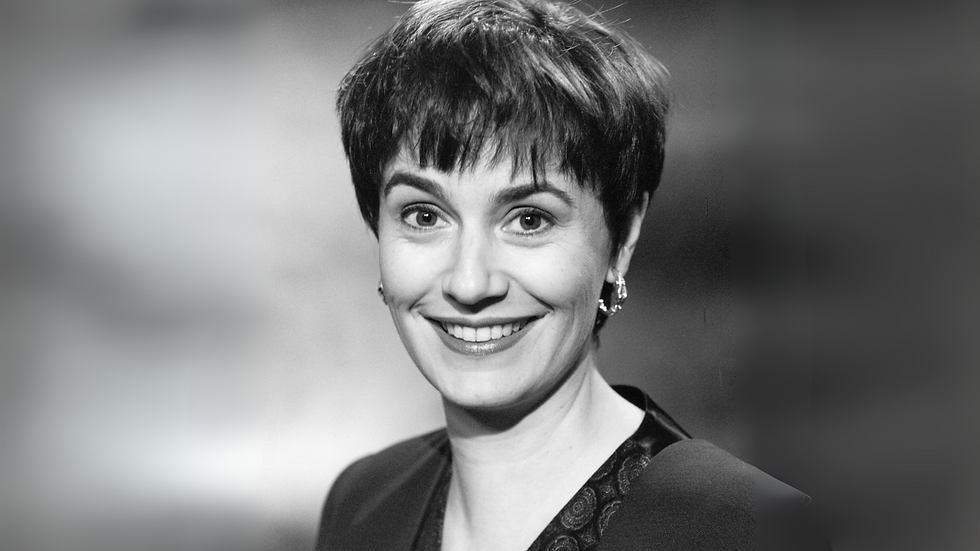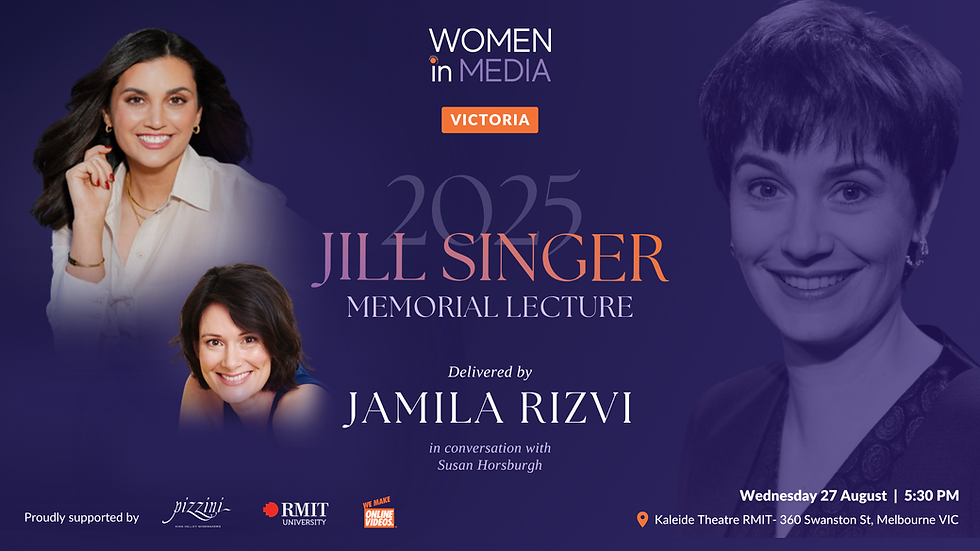Why Jill Singer’s Legacy Matters
- Aug 19, 2025
- 3 min read

By Fernanda Fain-Binda
From winning a Walkley award to teaching a generation of journalists, and dancing on tables along the way, Jill Singer had an extraordinary journalism career and life.
Her passion for truth and dedication to craft are a vital part of her legacy and the reason Women in Media celebrate her at a Memorial Lecture.
Jill’s remarkable impact in journalism still resonates today, according to author, podcaster and journalist Jamila Rizvi who will deliver the Jill Singer Memorial Lecture in Melbourne on 27 August.
“At a time when media faces a multitude of challenges, it’s the legacy of people like Jill that we should be looking to for guidance,” Jamila says.

“Jill knew what it meant to honour the story, above personal pride – or pay packet. Her legacy is one I deeply admire, especially her commitment to sharing her knowledge with the next generation.”
An award-winning journalist, Jill Singer taught Television Journalism at RMIT for 10 years. Prior to that, she presented and produced news and current affairs programs for ABC and the Seven Network. She wrote a weekly column for the Herald Sun from 1997-2012 and authored a book on commercial surrogacy.
“We couldn’t believe it when SHE applied (in 2008),” remembers Professor Alexandra Wake, Program Manager for RMIT’s Graduate Diploma in Journalism, WiM’s partner for this event. “She took a normal teaching job, no special treatment. The students knew Jill was one of the country’s greatest journalists, just from working with her.”
Jill won a Walkley Award in 1992 for her investigation into the death of an infant with severe abnormalities, which effected a change in the law. She won two Quill Awards, one for her investigation into ExxonMobil in 1999, and another in 2010, with Lisa Whitehead, for reporting into family violence.
“The students were so excited when that happened,” says Prof. Wake. “Jill wasn’t just super smart and beautiful, she worked so very hard.”
Other women in media knew to expect the truth from Jill.
“I remember the night when she told a live TV audience that the promised story about then-premiere Jeff Kennett had been pulled at the last minute – something she obviously disagreed with,” says Colleen Coghlan, Co-Convenor of Women in Media Victoria.
It was 1996 and Jill then collapsed in front of Melbourne’s Today Tonight viewers, due to a migraine. She continued to work in television, popular with viewers but maybe less so with management.
She was growingly popular with other media professionals. “Jill inspired young women to stand up for equal coverage in front of, and behind, the camera,” says Colleen. “She paved the way.”
When she moved into teaching, she did so with passion and ego-trimming feedback.
“She demanded excellence and expected the students to bring their A-game every time. She never could understand us cardigan-wearing academics who didn’t care much for appearances. ‘What’s wrong with you?’ she’d ask,” says Prof. Wake. “She also had a deep love for her daughter and granddaughter, and there wasn’t a day that she didn’t mention them.”
Jill led by example. A young mother on her course learnt how Jill balanced work and life by setting up a playpen for her daughter in the office. Another, the oldest in that year’s cohort, felt truly supported by Jill. Others remembered the practical tips she gave them on breathwork before presenting to camera, or her respect for all mediums, not just television.
Her legacy isn’t one of likeability, but of results.
Jill could craft a story with words and pictures, teaching women in her class how to present, shoot and cut video packages from the field. On another day, she was banned from the Oxford Scholar for dancing on a table.
At 60, she was diagnosed as terminally ill, but she went down writing.
‘It turns out I have a rare blood disorder called AL amyloidosis,’ she wrote in the Herald Sun in 2017, two months before her death. ‘I am determined not to be average, though, to make the most of every moment I have left.’
This August we celebrate women who take action, in memory of Jill Singer, a woman who continues to inspire us.
“I am humbled to be speaking as part of an event that honours her contribution,” says Jamila Rizvi.
“I look forward to exploring the challenges facing women in media, as well as reflecting on the often-untold stories of women with disabilities and chronic illness.”
The Jill Singer Memorial Lecture 2025 will be delivered by Jamila Rizvi, hosted by journalist Susan Horsburgh, in partnership with RMIT.


